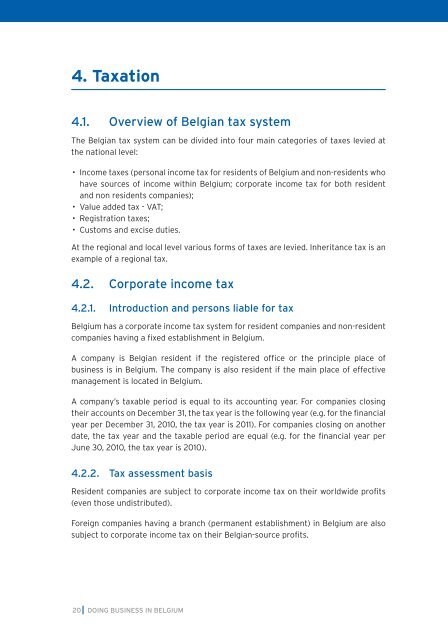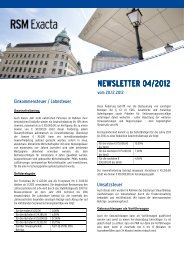Doing Business in Belgium - RSM International
Doing Business in Belgium - RSM International
Doing Business in Belgium - RSM International
You also want an ePaper? Increase the reach of your titles
YUMPU automatically turns print PDFs into web optimized ePapers that Google loves.
4. Taxation<br />
4.1. Overview of Belgian tax system<br />
The Belgian tax system can be divided <strong>in</strong>to four ma<strong>in</strong> categories of taxes levied at<br />
the national level:<br />
• Income taxes (personal <strong>in</strong>come tax for residents of <strong>Belgium</strong> and non-residents who<br />
have sources of <strong>in</strong>come with<strong>in</strong> <strong>Belgium</strong>; corporate <strong>in</strong>come tax for both resident<br />
and non residents companies);<br />
• Value added tax - VAT;<br />
• Registration taxes;<br />
• Customs and excise duties.<br />
At the regional and local level various forms of taxes are levied. Inheritance tax is an<br />
example of a regional tax.<br />
4.2. Corporate <strong>in</strong>come tax<br />
4.2.1. Introduction and persons liable for tax<br />
<strong>Belgium</strong> has a corporate <strong>in</strong>come tax system for resident companies and non-resident<br />
companies hav<strong>in</strong>g a fixed establishment <strong>in</strong> <strong>Belgium</strong>.<br />
A company is Belgian resident if the registered office or the pr<strong>in</strong>ciple place of<br />
bus<strong>in</strong>ess is <strong>in</strong> <strong>Belgium</strong>. The company is also resident if the ma<strong>in</strong> place of effective<br />
management is located <strong>in</strong> <strong>Belgium</strong>.<br />
A company’s taxable period is equal to its account<strong>in</strong>g year. For companies clos<strong>in</strong>g<br />
their accounts on December 31, the tax year is the follow<strong>in</strong>g year (e.g. for the f<strong>in</strong>ancial<br />
year per December 31, 2010, the tax year is 2011). For companies clos<strong>in</strong>g on another<br />
date, the tax year and the taxable period are equal (e.g. for the f<strong>in</strong>ancial year per<br />
June 30, 2010, the tax year is 2010).<br />
4.2.2. Tax assessment basis<br />
In pr<strong>in</strong>ciple the taxable basis is calculated on the basis of normal account<strong>in</strong>g rules,<br />
unless there are any specific exceptions foreseen <strong>in</strong> tax law. The basic rule is that<br />
a company’s taxable <strong>in</strong>come consists of any <strong>in</strong>crease <strong>in</strong> its total value as shown<br />
by the difference <strong>in</strong> the balance sheet between the beg<strong>in</strong>n<strong>in</strong>g and the end of the<br />
f<strong>in</strong>ancial year (without tak<strong>in</strong>g <strong>in</strong>to account capital <strong>in</strong>creases carried out dur<strong>in</strong>g the<br />
f<strong>in</strong>ancial year).<br />
The net taxable <strong>in</strong>come is divided <strong>in</strong>to three ma<strong>in</strong> categories of taxable <strong>in</strong>come:<br />
reta<strong>in</strong>ed earn<strong>in</strong>gs, certa<strong>in</strong> non-deductible expenses and dividends. The follow<strong>in</strong>g<br />
adjustments must be made when calculat<strong>in</strong>g the net taxable <strong>in</strong>come:<br />
• Determ<strong>in</strong>ation of the fiscal profits or losses;<br />
• Break-down of the tax profits or losses accord<strong>in</strong>g to their source<br />
(Belgian or foreign);<br />
• Deduction of <strong>in</strong>come which is exempt under DTA and certa<strong>in</strong> other deductions;<br />
• Deduction for “Participation Exemption” and for exempted movable <strong>in</strong>come;<br />
• Deduction for patent <strong>in</strong>come;<br />
• Allowance for corporate equity (= the notional <strong>in</strong>terest deduction);<br />
• Deduction of previous losses;<br />
• Investment deduction.<br />
The net taxable profit thus calculated is <strong>in</strong> pr<strong>in</strong>ciple taxed globally. The basic rate of<br />
corporate <strong>in</strong>come amounts to 33.99% (= 33% + temporary crisis surcharge of 3%).<br />
When profit is lower than 322,500 euro, companies can benefit from reduced tax<br />
rates if the follow<strong>in</strong>g conditions are met:<br />
• At least 50% of the shares must be hold by natural persons;<br />
• The value of participations <strong>in</strong> other companies may not exceed 50% of the paid-up<br />
capital <strong>in</strong>creased by the taxed reserves and the account<strong>in</strong>g capital ga<strong>in</strong>s (except<br />
for participations represent<strong>in</strong>g at least 75% of shares);<br />
• The company must attribute to at least one director of the company a remuneration<br />
of at least 36,000 euro (or at least the amount of the taxable <strong>in</strong>come if this is less<br />
than 36,000 euro);<br />
• The paid dividends may not exceed 13% of the company’s equity;<br />
• Not be<strong>in</strong>g member of a group which owns a “coord<strong>in</strong>ation centre” <strong>in</strong> <strong>Belgium</strong>.<br />
Resident companies are subject to corporate <strong>in</strong>come tax on their worldwide profits<br />
(even those undistributed).<br />
Foreign companies hav<strong>in</strong>g a branch (permanent establishment) <strong>in</strong> <strong>Belgium</strong> are also<br />
subject to corporate <strong>in</strong>come tax on their Belgian-source profits.<br />
20<br />
DOING BUSINESS IN BELGIUM<br />
DOING BUSINESS IN BELGIUM<br />
21














